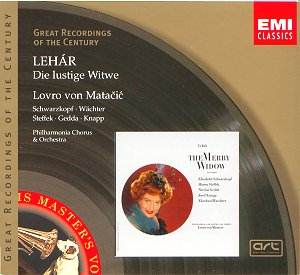LEHÁR:
Die lustige
Witwe
 Elisabeth Schwarzkopf (Hanna),
Eberhard Wächter (Danilo), Josef Knapp (Zeta), Nicolai Gedda (Camille),
Hanny Steffek (Valencienne), Philharmonia Chorus and Orchestra/Lovro von
Matacic.
Elisabeth Schwarzkopf (Hanna),
Eberhard Wächter (Danilo), Josef Knapp (Zeta), Nicolai Gedda (Camille),
Hanny Steffek (Valencienne), Philharmonia Chorus and Orchestra/Lovro von
Matacic.
Recorded in 1962
 EMI CMS5 67370 2 2CDs
28' 36"; 50.44"
EMI CMS5 67370 2 2CDs
28' 36"; 50.44"
Crotchet

If not absolutely everything in this famous Widow is perfect this
is because you don't create a great performance without taking risks.
Schwarzkopf's opening lines in Act 2 are surprisingly bumpy. An artist so
completely in control of herself must have had a reason for singing them
like this but I can't work out what it was. But go on from there and you
have a Vilja-Lied that is a minor miracle of vocal shading and verbal
pointing. You wouldn't think so much could be got out of it. Furthermore,
if some LP originals acquire paint-stripping qualities through digital
processing, not only has this one retained its bloom, but I've rarely heard
Schwarzkopf's voice sound so sweet, quite without that hardness that her
detractors sometimes complained of. And hear how she caresses the second
verse of the waltz (Bei jedem Walzerschritt, a little way into track
22 on disc 2). If these few seconds were all that were preserved of her,
posterity would still be left in no doubt that she was a very great singer
and artist. And what a character she makes of Hanna, in the dialogue no less
than the sung parts.
I have reservations about Wächter's Danilo. A lot of the time he is
splendid and he shows during his solos in the Act 1 finale that he can sing
with a honeyed tone and perfect legato when he wants to. Unfortunately, in
his most famous aria (Da geh' ich zu Maxim) he goes in for some vocal
characterisation which to my ears, rather than sounding funny, simply spoils
a good tune. His other big moment, the half-spoken, half-sung Es waren
zwei Königskinder, sounds like Sprechstimme and about as beautiful.
Gedda is a dream of a Camille except for a few bars in Wie eine
Rosenknospe where the conductor pulls back the tempo and the performance
becomes momentarily heavy (this doesn't happen when the piece is repeated
in the Act 2 finale). And a special mention for Hanny Steffek, a lovely artist
who turns her soft-centred voice into a real belter when she joins the grisettes
in Act 3.
If Matacic's rubatos occasionally go over the top this is because his elastic
beat is prepared to take risks that almost always pay off, with the dance
tempi sprung and the languorous moments caressed to perfection.
There are other ways of doing it; in Karajan's hands the music becomes a
requiem for the society it portrays, and in certain moods one might want
to hear that. Matacic himself, eighteen years later, conducted a movingly
valedictory reading for Italian Radio in Milan. But by and large this set
has seen off all comers since it first came out and probably will do so for
a good long while yet. It comes with a synopsis, libretto and a detailed
essay by Richard Osborne, in English, French and German; and if anybody thinks
that a first CD of under half-an-hour sounds like poor value, I can think
of plenty that last nearly three times as long and aren't worth a third of
what you pay for this.
Christopher Howell

